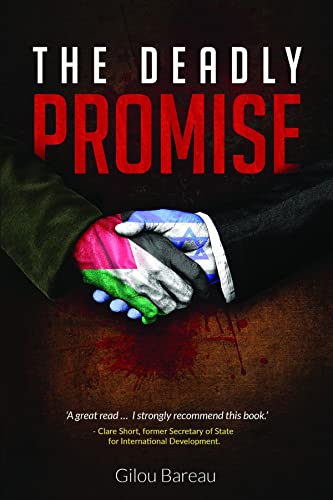The Deadly Promise: a thriller reviewed

JVL Introduction
We seldom note new fiction, but this book seems so directly relevant to JVL readers that we have no hesitation in posting a review by thriller aficionado Marion Roberts.
In her view this book, set mainly in London against the background of the build-up to the Gaza War in 2014, deserves to go viral.
Gilou Bareau, The Deadly Promise Author, Folrose Press 2023
Reviewed by Marion Roberts
This book is a thriller and a good one. The plot twist at the end is astonishing and thought-provoking. Its provocation comes from the author’s political stance, the characters, their relationships to each other and the setting. The setting has themes which are directly related to JVL’s politics. The author’s preface starts with the statement that he is ashamed of Israel and that he is part of the significant minority of Jews who support the Palestinians. This thriller is intended to explain why that is.
The action takes place between May and July 2014, against the background of the build-up to the Gaza War. The central character, Zach, is a Sephardic Jew, born and brought up in England. It is the sudden and suspicious death of his brother, a prominent member of a fictitious Palestine Liberation Movement, that sparks the plot. Throughout the twists and turns that follow, readers are presented with opposing Jewish views of Israel, Jewish self-determination and belief in a Jewish state. Questioning the traditions and beliefs of Orthodox Judaism and Zionism form part of Zach’s back story and journey throughout the book.
While events in Israel/Palestine form the background to the book, most of the action takes place in England, in London and Manchester, with only a short interlude in Israel itself. The focus of the book is on relations between Zach’s family and friends and individuals in fictitious pro-Israeli groups. A glossary clarifies which references are fictional and which are real. The narrative follows Zach and his search for the truth about his brother’s death, with occasional interspersions by another character whose identity and involvement are kept mysterious until the very end.
Other sub-themes provide fascinating detail. Political and cultural clashes between Ashkenazi and Sephardic Jews come into the story. There are loving descriptions of food, highlighting these differences in Jewish identities and of the congruence between Sephardic Jews and Arab cultures. The author thoughtfully provides a glossary to explain unfamiliar terms for a non-Jewish reader. Substance abuse plays a large part in the book. This theme is handled carefully and there is no romanticisation of either drugs or alcohol. Drug addiction helps to explain Zach’s alienation from conventional society, although its counterpoint in another character’s alcoholism seems contrived.
The book follows the conventions of the genre in that as the plot develops, Zach’s position becomes more and more difficult until the final revelation. It differs widely from the escapism of many thrillers though, with a political voice which does not shy away from descriptions of brutality and the impact that makes. The fear that many of the characters hold is not of some fanciful conspiracy, or of a mad serial killer, but firmly placed in the realities of Israeli oppression of Palestinians, the surveillance of pro-Palestinian supporters and the actions of rogue actors in extremist groups. The author’s own use of a pseudonym could be interpreted as a reflection of that fear. In contrast to the conventional trope of the investigator with no immediate ties of intimacy, the story is full of familial relations. Here the book takes a more literary turn in its approach to the ambivalent feelings that being brought up in a closely-knit community evokes. The author’s critical commentary on gender relations within and outside that community will appeal to many readers.
The Deadly Promise is well written in an easy, direct style and swiftly engages the reader in the plot. The production standards are good, with only one or two typos. Bareau’s intention to explain the views of a significant minority of Jewish opinion is achieved and so much more. The publisher, Folrose Press, according to its website, connects specialist authors to niche readerships. But this book deserves a wider readership, across and beyond the whole of the British left. It can easily stand against Jonathan Freedland’s thrillers written under the pseudonym of Sam Bourne, many of which deal with Jewish/Israeli themes, and from the perspective made clear in Freedland’s journalism. Thrillers and detective stories can reach a large audience, as is evidenced by the success of writers such as Ian Rankin. Some books do ‘go viral’, through word of mouth. Let’s hope this might be one of them.

Delighted JVL have touched on literature – there’s a massive hinterland of books about the Arab world including the relationship of Palestine with Israel published by Saqi books, poetry in particular, which holds a favoured place in Arab culture. Popular fictional representations of Israel and Israeli/Arab politics, including thrillers, are pretty commonplace, and tend to be much more nuanced and balanced than coverage in the MSM. Having said that, comparing Gilou Bareau to Sam Bourne sets a very low bar.
No matter. If we don’t incorporate Literature and Art into our understanding of the world we tend to become very two dimensional.